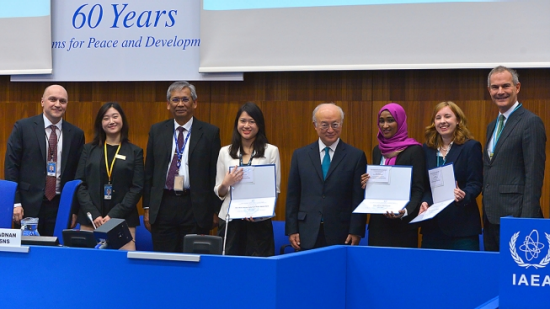12 Jul 2016
Wednesday 7 December 2016 18:30 CET
Jeremy Li, IAEA Office of Public Information and Communication

IAEA Director General Yukiya Amano today presented prizes to three young women who won the IAEA’s first ever essay competition. Their essays contained recommendations for strengthening nuclear security through stronger border controls, closer international cooperation and public education. The competition was sponsored by the Permanent Mission of the United Kingdom of Great Britain and Northern Ireland to the IAEA.
“I am delighted that so many young people were interested in nuclear issues and chose to enter the competition,” Mr Amano said before he and UK Ambassador Leigh Turner handed the prizes to the winners at IAEA Headquarters in Vienna.
The winners were Abeer Mohamed from Sudan, Noor Azura Zuhairah Binte Abdul Aziz from Singapore and Katharine Thomson from the United Kingdom.
The event took place on the sidelines of the IAEA International Conference on Nuclear Security, which is taking place this week.
Mr Amano said the quality of the entries was very high and the judges had faced a difficult task.
“I am especially pleased that all three winners are young women,” he said. “Women play an important role at all levels in the work of the IAEA, but I am committed to increasing the proportion of female staff, especially in more senior positions.”
Mr Amano encouraged students and young professionals to consider careers in nuclear science and technology. “It offers young people an opportunity to contribute to the well-being and prosperity of their own countries, and of the whole world,” he said.
In preparation for the conference, the IAEA invited students and young professionals to submit original and innovative essays on challenges in nuclear security. A panel of experts from the IAEA and the International Nuclear Security Education Network selected the three winners.
“These essays demonstrate a clear and compelling understanding of nuclear security and its many intricacies,” said Tim Andrews, Head of the Programme Development and International Cooperation Section at the IAEA. “They look to the future.”
Young professionals have the potential to contribute fresh and compelling insights into the future of nuclear security, Andrews said. Winners each received a 2000 euro cash prize and a certificate signed by Mr Amano. They were also invited to attend the nuclear security conference.
Community engagement for nuclear security
Abeer Mohamed, a student at Ritsumeikan University in Japan, was honoured for her essay entitled, ‘Encouraging community engagement as a strategy to strengthen nuclear security in our borders.’ It highlights the threats and challenges in developing countries with porous borders and limited nuclear security capacity because of insufficient equipment and funding. To improve border security, she suggests engaging the broader communities through education, establishing suitable domestic policies and better communication between the community and law enforcement agencies.
The importance of regional cooperation
The entry by Noor Azura Zuhairah Binte Abdul Aziz, a student at University College London, is called: ‘The future of nuclear security in Southeast Asia: commitments and actions.’ It discusses regional problems stemming from terrorism, maritime piracy and insufficient border controls. To address these challenges, she proposes closer international cooperation, especially among ASEAN countries, to strengthen capacity-building and create training programmes for all countries within the region. She also highlights the need for a comprehensive regulatory framework.
A medical physicist’s perspective
Katharine Thomson, from Musgrove Park Hospital in the United Kingdom, drew parallels between the common security challenges involving medical and other applications of radiation in her essay entitled ‘Future of nuclear security: commitments and actions, a medical physicist’s perspective’. Her proposals focused on engaging the public through education programmes, controlling access to dangerous material in order to eliminate insider threats, and enhancing cyber security by building comprehensive, usable and respected computer security systems.
The essay competition attracted 353 submissions from 79 countries. The winning essays reflect a diverse range of areas within nuclear security, said In Young Suh, an IAEA Associate Nuclear Security Officer, who was one of the judges. “The winners have a chance to present their ideas to policymakers, senior officials and nuclear security experts attending the conference.”
The essays are available here.
Ask MFA